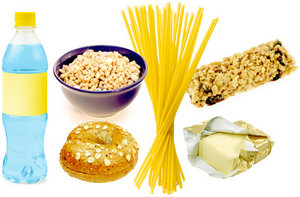Hidden Dangers Common Foods
By Nancy Irven, DC
You may have heard this before, but it deserves repeating: Many prepackaged and processed foods contain non-nutritious chemicals and food additives, including one or more of the following three ingredients: refined grains, trans fats and refined sugars. If we remove these three ingredients, we automatically remove many others simply by association.
For example, refined grains are listed as enriched wheat, cracked wheat, stone ground wheat, fortified multigrain, rice and puffed rice. The label must say whole wheat or brown rice if the grain is whole. Many manufacturers are now advertising that their products are made with whole wheat. Look closely at the list of ingredients; if
whole wheat is not listed first, it is not the primary ingredient. Many of the products list the whole wheat much further down the list of ingredients, which indicates less of it in the product.
Since January 2006, trans fats have been listed in the box labeled "nutrition facts." Products can say "zero trans fats," and yet if you look in the list of ingredients, you will see the words partially hydrogenated vegetable oil, which is another name for trans fats. By law, the manufacturers can put "0" trans fats in the nutrition facts if a serving contains less than .5 grams of it. Serving sizes have been greatly reduced due to this legislation. For example, the serving size for some chips is now six chips. What chip eater only eats six chips? The bottom line is there is no safe level of trans fats, yet they are in thousands of foods marketed as "healthy" and eaten daily.
Refined sugars are listed as high-fructose corn syrup, glucose, fructose, maltodextrin, sorbitol, mannitol, dextrin and maltose. None of these sweeteners provides superior nutrition because of the refinement process. When molasses or cane sugar is refined, the process removes approximately 95% of chromium, 89% of manganese, 98% of cobalt, 83% of copper, 98% of zinc and 98% of magnesium from the original food. High-fructose corn syrup may even be worse than other refined sugars because it does not stimulate the hormone leptin, which normally makes us feel full. Therefore, a product with high-fructose corn syrup can contribute to overeating and obesity.
 Dangerous foods can be defined as nutritionally deficient, frequently consumed and advertised to have "health benefits." The following foods have been chosen because in many cases, they contain refined grains, trans fats and/or refined sugars, and are consumed as daily "staples" in the majority of more than 1,000 diet diaries I have reviewed.
Dangerous foods can be defined as nutritionally deficient, frequently consumed and advertised to have "health benefits." The following foods have been chosen because in many cases, they contain refined grains, trans fats and/or refined sugars, and are consumed as daily "staples" in the majority of more than 1,000 diet diaries I have reviewed.
Breakfast Cereals
Most people start their day with some brand of cereal that may advertise numerous health benefits on the front of the box or package. When the list of ingredients is closely examined, you'll find as many as 32 items. Among these ingredients, usually in the first few listed, are the refined grains, partially hydrogenated vegetable oils and refined sugars. These ingredients are in hundreds of breakfast cereals, especially the colorful cereals with various shapes that are heavily marketed to children. The remaining ingredients often include food coloring agents and synthetic nutrients such as thiamin mononitrate, which is made from coal tar. This long list of ingredients offers minimal nutrition.
Try Instead: Look for cereals with little or no added sugar and a short list of ingredients you can pronounce. Whole grains should be at the top of the ingredients list.
Margarine and Butter Substitutes
Margarine is partially hydrogenated vegetable oil. This trans fat was advertised heavily for several decades as a healthy alternative to butter. Most of today's new butter replacements are not much better. Take a close look at the products that advertise "No Trans Fats" and "Proven to Significantly Lower Cholesterol." More often than not, you'll see the partially hydrogenated vegetable oil in the list of ingredients.
Try Instead: Experiment with olive oil, hummus, honey, or pureed fruits as toppings, depending on the meal, or use a real butter sparingly if you can't resist.

